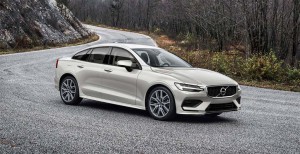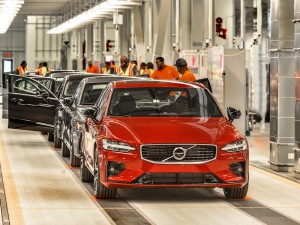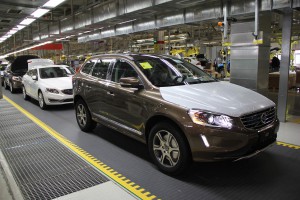Volvo’s plans for its first-ever American assembly plant have been thrown into turmoil as a result of Pres. Donald Trump’s trade war with China, something that will result in fewer auto exports from the South Carolina factory, potentially impacting hiring plans, the automaker’s U.S. CEO told TheDetroitBureau.com.
Volvo initially planned to use the Charleston facility as its global source for the all-new S60 sedan, while also producing some of its popular XC90 crossovers. Fully half of the assembly plant’s production was earmarked for China and other overseas markets, noted Anders Gustafson. But the administration’s escalating trade war has resulted in China boosting tariffs on American-made vehicles and parts from 25% to 40%, even as it reduces duties on auto imports from other trade partners to 15%.
“Now, we cannot export to China” because the S60 would be priced out of the market, Gustafson, the president and CEO of Volvo Car USA, said during an interview near Los Angeles, where the company was offering journalists a first drive of the S60. “In this segment, you can’t raise prices because of competitiveness.”
Instead, the Swedish executive said, “China will have to build up its own plant” to handle S60 production. Unless the trade dispute is resolved quickly, that could permanently reduce the potential for Volvo exporting to China from Charleston.
(Volvo moves XC60 production to Europe from China to avoid tariffs. Click Here for the story.)
Though based in Gothenburg, Sweden, Volvo is now owned by Chinese automaker Zhejiang Geely. That parent has already funded two new Volvo plants in China. They currently produce several products, including one now being shipped to the U.S. in small numbers. The Charleston plant was expected to offset any future imports from China, while also exporting American-made vehicles to Europe and other parts of the world.

The 2019 Volvo S60 built at the Charleston, S.C. plant was supposed to be shipped to China, but that has changed.
Complicating matters, Volvo also has to play wait-and-see when it comes to the possibility the administration will enact tariffs on other automotive imports, notably those from Europe.
The president earlier this year ordered the Commerce Department to investigate whether such imports pose a threat to national security. A final decision has not yet been reached but, as recently as Aug. 21, at a campaign rally in West Virginia, he declared, “We’re going to put a 25% tax on every car that comes into the United States from the European Union.”
EU officials have warned they would have to retaliate against such a move, something that could wipe out another potential market for products made by Volvo in South Carolina.
For now, it is still “full speed (ahead) on Europe,” said Gustafson, but Volvo is waiting to see if it will have to rethink that strategy in the amount of another trade war.
(Click Here for more about the Swedish Ambassador criticizing Trump’s tariffs.)
The Charleston plant officially launched production in June and Volvo will start retail sales of the S60 in the U.S. before the end of the year. It was set to bring in the XC90 in 2021.
Between now and then, the automaker plans to ramp up production at the new factory, eventually creating an estimated 3,900 jobs. But how many workers it ultimately will have, and how quickly they will be brought onboard will depend upon production plans.
“I need to find a substitute for the volumes” that would have gone to China, Gustafson said, a problem that would only be complicated by a second trade war with the EU.
Volvo isn’t the only automaker facing problems because of Trump trade policies. The tariff battle with China has had a serious impact on the BMW plant also based in South Carolina – the single largest source of U.S.-made auto exports. That facility is currently the only global source of production for SUVs like the midsize X5. BMW has seen a sharp fall-off in demand from China because of the tariff hikes, though it is trying to increase sales in the U.S. and other markets before cutting production and, potentially, reducing employment at the facility in Spartanburg.
Mercedes-Benz is taking the same approach with sport-utility vehicles produced at its factory in Vance, Alabama. It has also seen a slump in Chinese demand since the tariff battle began.
(Volvo launches car production at first-ever U.S. plant. Click Here for the story.)
Ford, meanwhile, said it is cutting production of its Mustang muscle car due to the tariffs.


